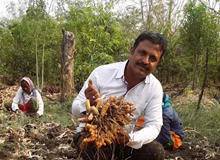
If you love cooking up a storm in your kitchen, then you should consider growing your own herbs as well. Most herbs don’t require a lot of sunlight or space to grow and can be grown on your windowsills or balconies. Growing your own herbs not only allows you to save money but also opens up new avenues of income, as you can sell them, sell seeds, or make essential oils.
Now, let us take a look at the most profitable herbs to grow.
-
Basil- Basil is an herb that can be grown from seeds or seedlings. This plant requires a lot of sunlight and thrives in warm temperatures. It is grown in humus, deep, and airy soil but will do well in other well-draining soil types as well. Basil is widely popular and is used as a key ingredient in many cuisines. Basil tends to be a sensitive and tender plant that should be kept indoors in the case of frost. When matured, its seeds can be used to propagate other plants, which can be sold as living herb plants.
Basil leaves can also be dried and sold in bulk. Other than Italian, there are several other varieties of basil that are just as nutritious and easy to grow. Basil is also used to make traditional medicine. For instance, basil is used to repel insects, prevent dental decay by inhibiting the growth of bad bacteria in the mouth, improve mental alertness when used in aromatherapy, improve cholesterol levels, and reduce blood pressure in people.
-
Coriander- Coriander, also known as dhania or cilantro is a plant this is widely cultivated in all parts of the world for its culinary purposes. Coriander leaves and coriander seeds are used as an herb and a spice in cooking. Its leaves are usually added to the dish as a garnish immediately before serving. Whereas its seeds are commonly grounded into a fine powder and are famously used to make Indian curries.
This dual-purpose plant appeals to the sensibilities of many cultures and is a staple in the spice cabinet. Coriander also has several health benefits. For instance, coriander boosts our immunity and prevents cellular damage caused by free radicals in our bodies. Some studies show that coriander also reduces bad cholesterol levels and helps flush out excess sodium and water from our body, thereby, lowering our blood pressure. Oil extracted from coriander seeds can also decrease abdominal discomfort, and bloating, and improve gut health.
-
Chamomile- The dried flowers of the chamomile plants are commonly used to make a tea which has several health benefits. For centuries, this herb has been valued as a digestive relaxant that can treat various gastrointestinal disturbances such as indigestion, bloating, and flatulence. Chamomile tea contains chemical compounds that reduce inflammation caused by a wide range of problems such as arthritis, gastrointestinal pain, and hemorrhoids. It also helps people relax, induces sleep, and improves the quality of sleep.
-
Oregano- Oregano is an herb that belongs to the mint family Lamiaceae and has been used in cooking for thousands of years. Originally, it was native to the Mediterranean region but it has since naturalized everywhere and can grow in the temperate Northern Hemisphere. Oregano has several medicinal purposes. For instance, carvacrol present in oregano helps reduce inflammation of the skin when taken internally and applied externally.
The saponins, alkaloids, and flavonoids present in oregano prevent the formation of urinary stones. Oregano is also used to treat stomach aches. Oregano exhibits strong microbial properties which cause the decrease of acne-causing bacteria. And unlike antibiotics prescribed for acne, oregano doesn’t cause side effects. Several compounds found in Oregano help manage type 2 diabetes by improving a person’s insulin resistance, restoring damaged kidney and liver tissues, and regulating the metabolizing of carbohydrates.











